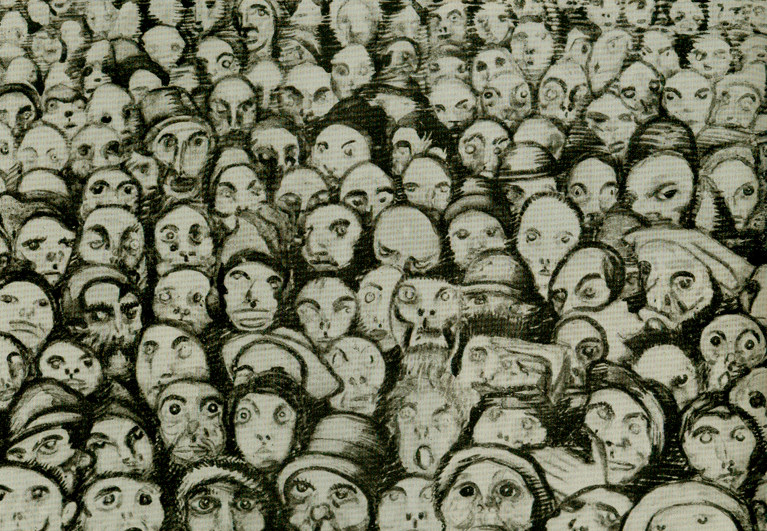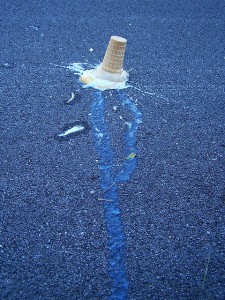Reading, you speak to yourself inside your head?
How bout when you’re writing?
Where does it go?
Hmm?
There’s a really interesting article in the Wall Street Journal about how language shapes thinking. (Thanks Robb Todd for the link.)
Some Thoughts On Book Reviews

Today I have been thinking about book reviews as tentacles of the book being reviewed, as an extension of the book, an addition to it. Like a book is a blog post and a review is the comment stream. Each blog post shares a symbiotic (parasitic?) relationship with its comment stream – unless, of course, you disable the comment stream, in which case you disallow the formation of direct extensions — of course someone could always do their own blog post linking to your post thereby forming an extension at their own site. In a way, thinking this way calls into question the notion of authorial sovereignty, which is to say: according to an older type of model, I write a book and therefore I am the author and I control the object — whereas in a newer type of model, if I write a book (or a blog post) the reviews (or the comment stream) can easily overtake the book (blog post) thereby pushing my role into the background and replacing it with whatever creation those extraneous appendages (comment streams) create, which is to say that my authority over the text gets taken out of my hands. But that’s not really where I want to go with this post. I don’t want to argue that a book review can somehow surpass the book being reviewed, because the whole reason I got on this mental pathway is because I have recently read a few book reviews that I thought were stand out pieces of literature in their own right – not better than the work being reviewed, but on par with it, as if the review was in some ways a productive extension of the book, a part of the book written by someone else…
August 6th, 2010 / 4:25 pm
It is Friday: Go Right Ahead
At the table inquire, “Anyone not for beer?”
Throw yourself about, do imitations, maybe even fight a little
x drinks drunk in y moments are more potent than x drinks drunk in 2y moments
He resolved, having done it once, never to move his eyeballs again
At least a hangover is the truth

Put a broad hand on the beer-engine!
Sometimes being a friend means mastering the art of timing
Have some bitter and go to the prom
Being drunk is one big ellipsis
Mayonnaise will remove stains
Some of Poe’s tales convey perfectly the idea of a hangover
I am a flashy dresser and I shout a lot!
I should stop, but it is OK to get drunk if a certain thing goes wrong. It has. So here I go
Marco Brambilla’s Civilization
Civilization by Marco Brambilla from CRUSH on Vimeo.
That apparently inspired this. Which just goes to show: inspiration is really not enough.

Haruki Murakami has a lot of issues (not talking about his various extra copies of The New Yorker in which he published) and being alienated in Tokyo with a hard-on is not one of them. Does thinking you have hypochondria make you a hypochondriac? What if you really suffer from thinking you suffer? I suspect Murakami, during and in between writing novels and their respective advances, has a handful of time on his hands — and should those hands be populated with parts of his failing body, then we are not to judge. Everyone loves a sensitive man, but lay off the Bengay.
The last Pindeldyboz. (And again I’m posting about a death.) Thanks to all the editors who worked there over the years. UPDATE: ‘Dja publish there at some point? Give us a link in the comments.
August 5th, 2010 / 5:29 pm
Splat in the Memory
This happened to my daughter, who is under 2, two weeks ago. She is still talking about it: “I-cream fell. I-cream. FELL. I. Cream. ISE. FELL.” When she wakes up, it’s one of the first things she says, and repeats, as though she’d relived the experience during her sleep. If something else falls, she mentions the ice cream fall again. It has become Something in her mind, an event, perhaps a trauma, certainly a point of reference. An image that has stayed.
It has been asked before, but it’s worthwhile to re-up: what is one image from a book that has become indelible in your mind?
And here’s the B-Side: do we put too much importance on “the memorable image,” or “memorability” in general, with regard to the books we read? Are the ones that stay with us automatically “better”? Because I’ve read plenty of books that have absorbed me fully in the reading, in the moment, but that seem to vaporize as soon as I’m done. Are such works somehow inferior? Which ones are you more likely to re-read, the ones that you remember, or the ones that you don’t? Is re-read value adequate for determining a book’s worth?


